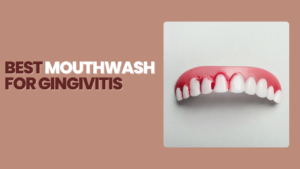Gingivitis is the earliest stage of gum disease, causing redness, swelling, and bleeding gums. If left untreated, it can progress to periodontitis, leading to tooth loss. Using a high-quality mouthwash along with brushing and flossing can help reduce plaque, kill bacteria, and promote gum health.
Here we’ll cover:
✔ Best mouthwashes for gingivitis (both medicated and natural options)
✔ How mouthwash helps prevent gum disease
✔ What to look for in an anti-gingivitis mouthwash
✔ Tips for using mouthwash effectively
How Does Mouthwash Help with Gingivitis?
Mouthwash plays a key role in reducing plaque buildup and killing bacteria that cause gingivitis. Here’s how it works:
✔ Kills harmful bacteria that cause gum infections
✔ Reduces plaque formation between teeth and along the gumline
✔ Soothes inflamed gums and reduces swelling
✔ Freshens breath by eliminating odor-causing bacteria
✔ Reaches areas missed by brushing and flossing
A good anti-gingivitis mouthwash should contain antibacterial ingredients like chlorhexidine, cetylpyridinium chloride (CPC), or essential oils.
Best Mouthwashes for Gingivitis

Here are the top dentist-recommended mouthwashes to fight gingivitis and promote gum health.
1. Listerine Antiseptic Mouthwash (Best for Overall Gum Health)
✅ Contains essential oils (eucalyptol, menthol, thymol) to fight bacteria
✅ Clinically proven to reduce plaque and gingivitis
✅ Alcohol-based formula for deep cleaning
🔹 Best for: People looking for a powerful antiseptic mouthwash
2. Crest Pro-Health Mouthwash (Best Alcohol-Free Option)
✅ Contains cetylpyridinium chloride (CPC) to kill bacteria
✅ Alcohol-free formula (gentle on sensitive gums)
✅ Helps prevent gingivitis, plaque, and bad breath
🔹 Best for: Those who prefer an alcohol-free alternative
3. Colgate Peroxyl Mouthwash (Best for Gum Healing)
✅ Contains hydrogen peroxide for antibacterial and healing effects
✅ Reduces gum inflammation, swelling, and irritation
✅ Helps in faster healing of minor gum injuries
🔹 Best for: People with sensitive, inflamed, or sore gums
4. TheraBreath Healthy Gums Mouthwash (Best for Fresh Breath and Gum Health)
✅ Contains cetylpyridinium chloride (CPC) for antibacterial action
✅ No alcohol, no artificial flavors
✅ Helps prevent gingivitis and bad breath
🔹 Best for: Those who want a natural, gentle formula
5. CloSYS Ultra Sensitive Mouthwash (Best for Sensitive Gums)
✅ Contains chlorine dioxide to fight bacteria
✅ Alcohol-free, dye-free, and sulfate-free
✅ Helps control plaque and gum disease
🔹 Best for: People with ultra-sensitive gums
6. Parodontax Active Gum Health Mouthwash (Best for Gum Strengthening)
✅ Prevents plaque buildup that leads to gingivitis
✅ Alcohol-free and contains antibacterial ingredients
✅ Helps keep gums strong and healthy
🔹 Best for: Long-term gum disease prevention
7. Peridex (Chlorhexidine Gluconate 0.12%) (Best Prescription Mouthwash)
✅ Prescription-strength mouthwash for severe gingivitis
✅ Reduces inflammation, bleeding, and plaque buildup
✅ Often recommended after gum surgery or deep cleaning
🔹 Best for: Severe gingivitis and post-dental procedures (Only available with a prescription)
How to Choose the Best Mouthwash for Gingivitis
When selecting a mouthwash, consider the following:
✔ Antibacterial Ingredients – Look for chlorhexidine, CPC, or essential oils to kill bacteria.
✔ Alcohol vs. Alcohol-Free – Alcohol-based mouthwashes can be harsh; choose alcohol-free if you have sensitive gums.
✔ Plaque Control – Ensure the formula helps reduce plaque buildup, the main cause of gingivitis.
✔ Healing Properties – Some mouthwashes contain hydrogen peroxide to promote gum healing.
✔ ADA Seal of Approval – The American Dental Association (ADA) seal ensures safety and effectiveness.
How to Use Mouthwash Effectively for Gingivitis
🔹 Brush and Floss First – Mouthwash should be used after brushing and flossing to remove food particles and plaque.
🔹 Measure the Right Amount – Use about 20ml (4 teaspoons) or as directed on the bottle.
🔹 Swish for 30-60 Seconds – Move the mouthwash around your teeth and gums to ensure full coverage.
🔹 Don’t Rinse Immediately – Avoid eating, drinking, or rinsing for at least 30 minutes to let the active ingredients work.
🔹 Use Twice Daily – Morning and night for maximum protection.
Following these steps will enhance the effectiveness of the mouthwash in preventing and treating gingivitis.
Additional Tips for Preventing Gingivitis
While mouthwash is helpful, it cannot replace brushing and flossing. Here are some extra steps to maintain healthy gums:
✔ Brush twice daily with fluoride toothpaste
✔ Floss daily to remove plaque between teeth
✔ Eat a balanced diet rich in vitamins C and D
✔ Avoid smoking and alcohol, which can worsen gum disease
✔ Visit your dentist regularly for professional cleanings
Conclusion
Using the right mouthwash can be a powerful tool in preventing and treating gingivitis. Whether you prefer a strong antiseptic formula like Listerine, a gentle alcohol-free option like Crest Pro-Health, or a prescription-strength rinse like Peridex, there’s a mouthwash that fits your needs.
However, mouthwash alone isn’t enough—combine it with brushing, flossing, and regular dental visits for the best gum health.
If you have persistent gum inflammation, bleeding, or swelling, consult a dentist immediately to prevent further complications.
FAQs
1. Can mouthwash alone cure gingivitis?
No, mouthwash helps reduce bacteria and plaque, but for the best results, it should be combined with brushing, flossing, and regular dental cleanings.
2. How often should I use mouthwash for gingivitis?
Most dentists recommend using mouthwash twice daily—once in the morning and once before bed.
3. Can I use hydrogen peroxide as a mouthwash for gingivitis?
Yes, diluted hydrogen peroxide (3%) can help kill bacteria and promote healing. However, to avoid irritation, it should only be used occasionally.
4. What is the strongest mouthwash for gingivitis?
Chlorhexidine (Peridex) is the most powerful prescription mouthwash for severe gingivitis, but it should only be used under a dentist’s guidance.
5. Is alcohol-free mouthwash better for gingivitis?
Yes, alcohol-free mouthwashes are gentler and less likely to cause gum irritation, making them ideal for people with sensitive gums.

